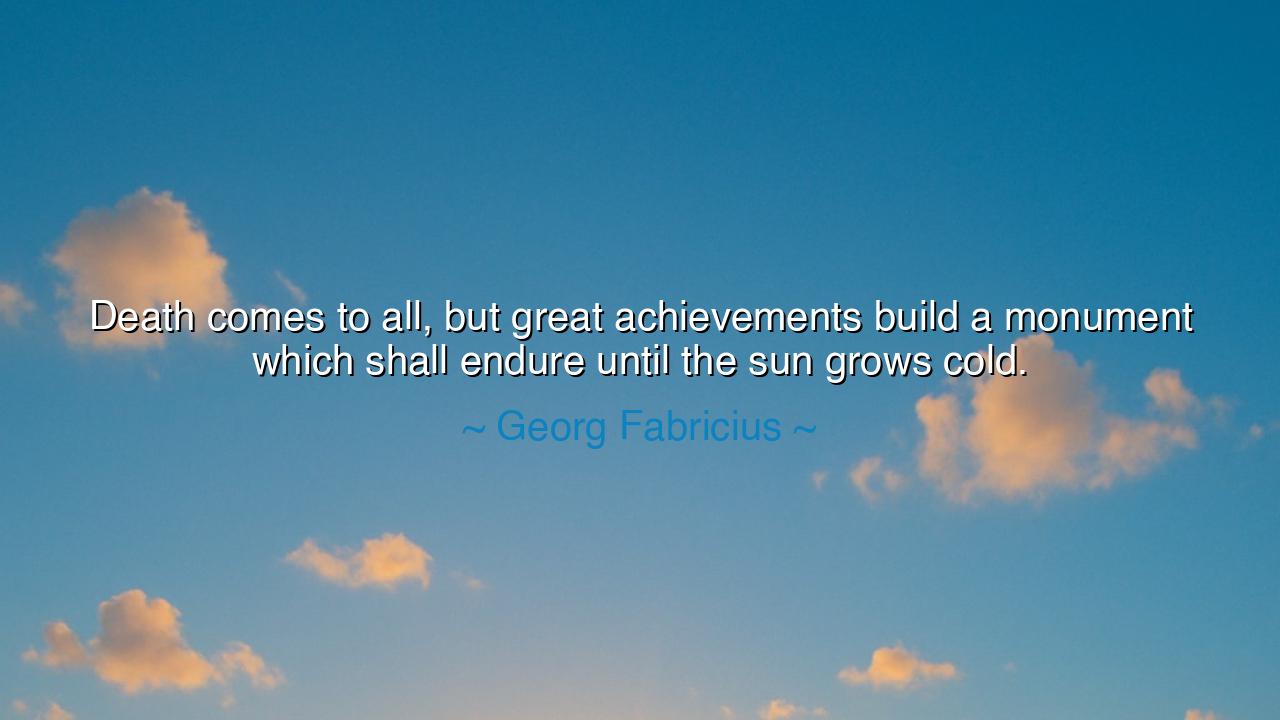
Death comes to all, but great achievements build a monument which
Death comes to all, but great achievements build a monument which shall endure until the sun grows cold.






Hearken, O children of the ages, and attend to the solemn words of Georg Fabricius: “Death comes to all, but great achievements build a monument which shall endure until the sun grows cold.” In these words lies the eternal truth of mortality and legacy, a meditation upon the fleeting nature of life and the enduring power of deeds. From the dawn of humanity, men have wrestled with the inevitability of death, seeking to inscribe upon the world a mark that will outlast the fragile span of flesh. Fabricius reminds us that while the body fades, the spirit expressed through noble achievement may endure, shining like a beacon for generations yet unborn.
Consider the nature of mortality. All men and women must pass through the shadow of death; the body returns to dust, and memory alone may falter. Yet within each soul resides the capacity to act, to create, to influence the world in ways that transcend mere existence. The poet, the builder, the philosopher, and the leader alike may craft works, ideas, and institutions whose influence outlives their mortal span. Death, inevitable and impartial, cannot touch the monument of greatness wrought by will, vision, and courage.
History offers countless testimonies to this truth. The pyramids of Egypt, raised thousands of years ago, still whisper the grandeur of Pharaohs and the labor of countless hands. The words of Homer, sung through the ages, continue to stir hearts and illuminate the human condition. Alexander the Great, though mortal, carved empires that reshaped continents and civilizations, leaving a legacy that even time cannot erase. In each case, death claimed the individual, yet the monument of their deeds endures—a testament to the enduring power of greatness.
Fabricius’ insight also illuminates the relationship between action and remembrance. Great achievements are not measured solely by immediate recognition but by their capacity to withstand the ravages of time. A work of courage, artistry, or wisdom becomes immortal through its influence, inspiring those who come after. Socrates, condemned and executed, left no physical monument, yet his ideas and method endure, shaping thought across centuries. The essence of immortality lies not in the flesh, but in the resonance of one’s deeds upon the world.
The lesson extends to the individual soul, urging a life of purpose and diligence. To dwell solely upon the fleeting comforts of existence is to forfeit the opportunity to craft a legacy. Every act of creation, every display of courage, and every labor in pursuit of knowledge contributes to a monument that defies decay. The historian Fabricius, himself a scholar of antiquity, recognized that human effort, guided by virtue and vision, leaves traces that endure beyond the mortal span, illuminating paths for others to follow.
Practical wisdom flows from this reflection. Seek endeavors that transcend self-interest: cultivate knowledge, inspire others, create works of beauty, and act with courage. Consider how your deeds may endure, how they might influence hearts and minds long after your mortal presence has departed. Invest in acts that ripple across time, that speak to the noblest aspirations of humanity, and that elevate the spirit beyond the limits of flesh and bone.
Let the generations remember this eternal truth: death is inevitable, yet greatness endures. Georg Fabricius’ words remind us that while life is fragile, the monuments of courage, wisdom, and creation may shine undiminished until the very end of the cosmos. By dedicating oneself to noble achievement, one partakes in the eternal, leaving a testament that time itself cannot efface.
Therefore, O seeker of purpose, act with vision, courage, and care. Strive to create, to teach, to inspire, and to leave the world richer than you found it. Let your deeds be a monument, visible not only in stone or word but in the lives touched, the hearts moved, and the wisdom imparted. In this pursuit, death may claim the body, yet your greatness will endure, luminous and eternal, until the sun itself grows cold.






AAdministratorAdministrator
Welcome, honored guests. Please leave a comment, we will respond soon